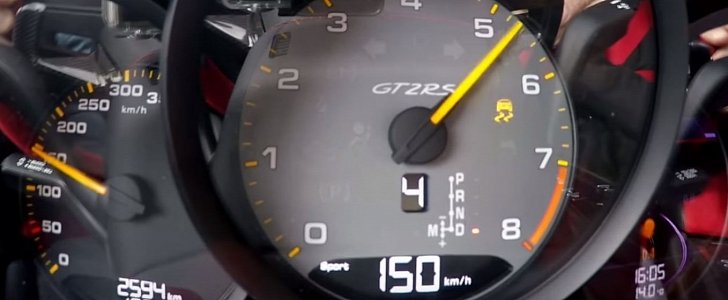When Porsche came up with the 2018 911 GT2 RS, there was one subtle aspect that drew our attention, namely Zuffenhausen's willingness to gift the rear-wheel-drive special with a new nickname - King Kong.
The 997 incarnation of the GT2 RS had earned itself the Widowmaker nickname, and with 620 unleashed horses, this seemed just right - after all, we are talking about a machine that's essentially a Turbo with more power and no all-wheel-drive, while lighter bits are also on the menu, so how can this not spell trouble?
Well, the tech advances of the 991 generation mean that King Kong is a much more suitable nickname for the Rennsport Neunelfer.
Sure, power and torque might be up compared to the previous model, but so is the level of control offered by the beast.
When driven casually, the GT2 RS feels surprisingly docile. Sure, its solid bushings and uber-thin soundproofing mean this isn't a Grand Tourer, but the car can still surprise its driver when, for instance, used in city traffic.
All this while having grabbed the title of the quickest production car on the Nurburgring, with a lap time of 6:47.
"Cool, so what about the behavior at the limit?" we hear you asking. Of course, such a question requires multiple answers and we're here to focus on what happens when one mashes the throttle on a wet road.
We've brought along a piece of footage that showcases the rear-engined machine performing an acceleration test on a wet road, thanks to the aficionados over at Motor Magazine.
With the animal going from standstill to 170 km/h (make that 105 mph) in maximum attack mode, you'll get to see the electronic nanny warning being displayed on multiple occasions. Nevertheless, the GT2 RS managed to put the power down remarkably well.
Keep in mind that the example we have here is gifted with the optional Weissach Package, as indicated by the carbon shift paddles - this offers a weight saving of around 30 kg or 66 lbs.
Well, the tech advances of the 991 generation mean that King Kong is a much more suitable nickname for the Rennsport Neunelfer.
Sure, power and torque might be up compared to the previous model, but so is the level of control offered by the beast.
When driven casually, the GT2 RS feels surprisingly docile. Sure, its solid bushings and uber-thin soundproofing mean this isn't a Grand Tourer, but the car can still surprise its driver when, for instance, used in city traffic.
All this while having grabbed the title of the quickest production car on the Nurburgring, with a lap time of 6:47.
"Cool, so what about the behavior at the limit?" we hear you asking. Of course, such a question requires multiple answers and we're here to focus on what happens when one mashes the throttle on a wet road.
We've brought along a piece of footage that showcases the rear-engined machine performing an acceleration test on a wet road, thanks to the aficionados over at Motor Magazine.
With the animal going from standstill to 170 km/h (make that 105 mph) in maximum attack mode, you'll get to see the electronic nanny warning being displayed on multiple occasions. Nevertheless, the GT2 RS managed to put the power down remarkably well.
Keep in mind that the example we have here is gifted with the optional Weissach Package, as indicated by the carbon shift paddles - this offers a weight saving of around 30 kg or 66 lbs.


